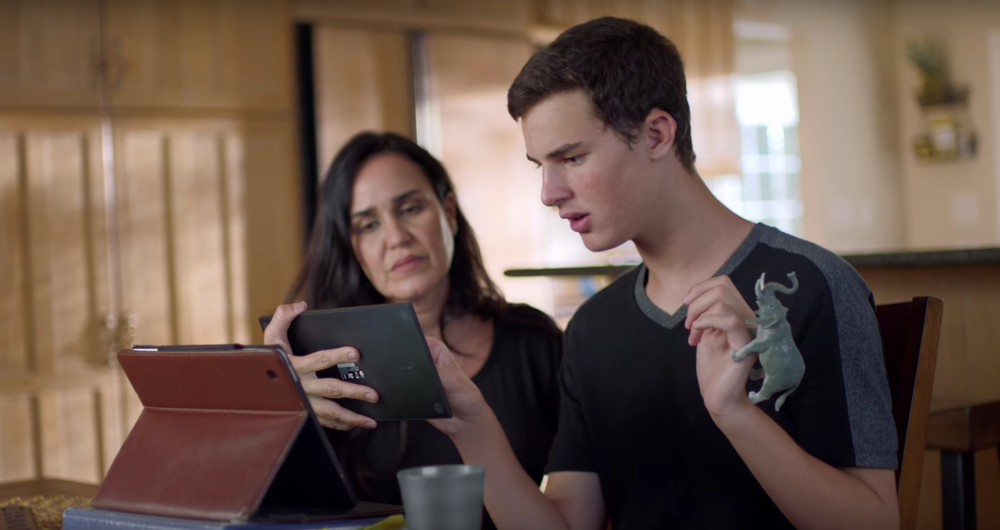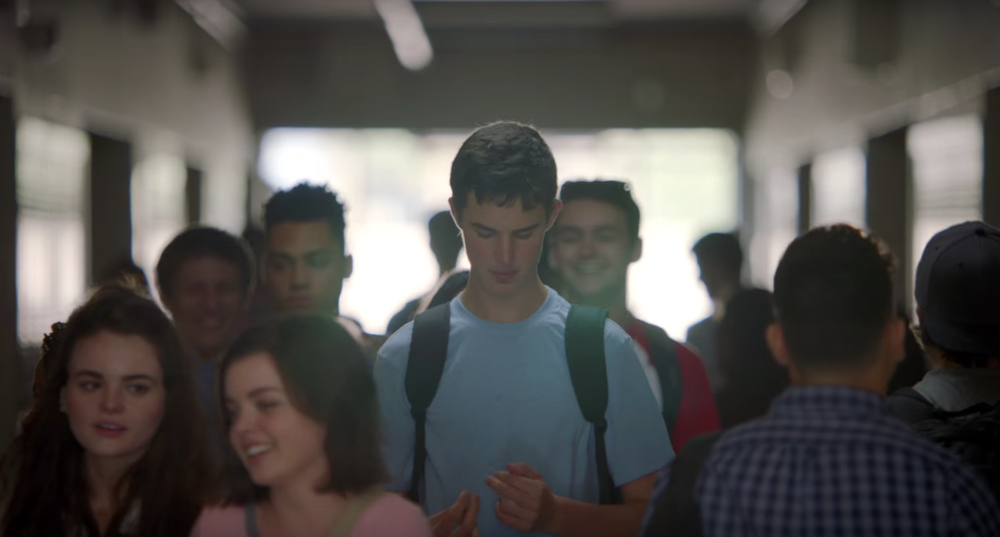Autistic teen shows how tech transforms lives
Dillan Barmache can’t speak, but that doesn’t mean he doesn’t have anything to say.
In fact, Dillan has complex and powerful thoughts, and thanks to easily accessible technology paired with innovative apps, you can hear his perspective.

Dillan’s Voice. Image: Apple
Katie Dupere, Mashable April 2, 2016
Dillan, who is autistic and nonverbal, is the star of a new short film created by Apple to celebrate Autism Acceptance Day. Notably, the film tells Dillan’s story through his own words, typed out on an iPad then spoken out loud via an augmented and alternative communication (AAC) app.
The film, called Dillan’s Voice, is an important departure from the way many non-autistic people often think of autistic individuals, especially those who are nonverbal. People on the autism spectrum aren’t always given agency or control over their own narratives — their stories are often filtered through well-meaning family members and caregivers looking to spread awareness.
But Dillan, like most 16-year-olds, is a teen with a lot of thoughts to express — and he can say them all. He just uses a tool to help.

Dillan Barmache (right), with his behavioral therapist/communication partner, Debbie Spengler. Image: Apple
Dillan has been using an iPad as a communication tool for about three years. His use of the technology actually went viral in 2014, after he used his tablet and an AAC app to deliver a moving middle school graduation speech.
Over the past three years, the technology has become an essential part of Dillan’s daily life — whether it’s at school, socializing or simply talking with his mother, Tami Barmache. But, prior to the tablet’s presence in his life, Dillan says he spent much of his younger years struggling to connect with people.
So many people can’t understand I have a mind. All they see is a person who is not in control.
Conventional means of speaking — moving your mouth and activating your vocal chords in complicated ways to produce standard sounds that others can understand — was impossible for him.
“So many people can’t understand I have a mind,” Dillan says in the film. “All they see is a person who is not in control.”
But Dillan says that the use of his tablet and AAC apps has helped him not only “see” his words, but hold onto his thoughts. And it’s made an incredible impact on Dillan’s life.
“At school, I now can have a conversation,” he tells Mashable via email. “I can share [answers to questions] with my classmates to amaze them that this totally awkward and sometimes strange guy is as smart as they are.”

Dillan. Image: Apple
Although he sees himself as sometimes awkward and strange, Dillan is undoubtedly eloquent and thoughtful. And he is using his skills with words to claim his own story for himself, telling it with bold honesty.
Hearing Dillan’s voice is incredible. He’s insightful and smart and creative.
Dillan, for one, knows how he is perceived by those who don’t understand autism. The real him, he says, is hidden from them behind “autism’s noticeable movements and noises,” making him appear to others as strange and unfamiliar.
“Attitudes last,” Dillan tells Mashable. “And the ones about a very misunderstood and often hard-to-explain condition have placed all autistic people in a hidden world, sometimes never to be heard from.”
| Dillan’s Path. appledude101. Youtube Aug 18, 2017 |
| Apple Dillan’s Voice. Adfilms TV Commercial. Youtube Sep 26, 2018 |
But with the help of his iPad, Dillan says he has been freed from the perceptions that have previously clouded people’s views of him.
“The iPad allows me to be seen,” he puts it simply.
Apple believes the use of its products in this way — as a tool that Dillan and people with similar experiences value as life-shifting technology — is something the company considers powerful.
“For Apple, accessibility is about empowering everyone to use our technology to be creative, productive and independent,” Sarah Herrlinger, senior manager for global accessibility policy and initiatives at Apple, tells Mashable. “Dillan’s message is powerful, and we are grateful the iPad and apps are playing such an impactful role in his life.”
And that empowerment is essential. At one particularly jarring and raw portion of the behind-the-scenes film, Dillan describes having autism as like “being in hell” and a “lonely existence.” But he says using the iPad as a tool has helped alleviate some of those feelings by amplifying his voice.
“I get to have conversations, and have people dear to me see and hear the person I am,” he says. “Having that makes anyone’s life less lonely, right?”
Source Mashable
| Highlighting technology’s effect on those with special needs |
Chance Miller, 9to5 Mac April 2, 2016
The two-minute short film shows Dillan using his iPad around the house, in school, and in various social settings to express his thoughts.
Autism Acceptance Month is dedicated to the stories of people like Dillan. His words remind us how important it is to ensure everyone with a voice can be heard.
Apple has been recognized in the past for its accessibility features. Last year, the American Foundation for the Blind honored Apple with the Helen Keller Achievement Awards for its VoiceOver functionality. The foundation has also said in the past that Apple has done “more for accessibility than any other company.”
Source 9to5 Mac
| Dillan Barmache & Debbie Spangler: Everyone Included – Precision Medicine Initiative. With some aid from caregiver Debbie Spangler, ePatient Dillan Barmache discusses his experiences living with Autism and makes an appeal for revising treatment for individuals with Autism. This talk is preceded by a screening of a film about Dylan’s experiences living with Autism. ePatient scholar Dillan Barmache. Stanford Medicine X. Youtube Feb 27, 2017 |
| Further reading |
Promoting Daily Living Skills for Adolescents with Autism Spectrum Disorder via Parent Delivery of Video Prompting, Cruz-Torres E, Duffy ML, Brady MP, Bennett KD, Goldstein P. J Autism Dev Disord. 2019 Oct 8. doi: 10.1007/s10803-019-04215-6. [Epub ahead of print]
Comparing the effectiveness of virtual reality and video modelling as an intervention strategy for individuals with Autism Spectrum Disorder: Brief report, Fitzgerald E, Yap HK, Ashton C, Moore DW, Furlonger B, Anderson A, Kickbush R, Donald J, Busacca M, English DL. Dev Neurorehabil. 2018 Apr;21(3):197-201. doi: 10.1080/17518423.2018.1432713. Epub 2018 Feb 5.
Effects of video modeling with video feedback on vocational skills of adults with autism spectrum disorder, English DL, Gounden S, Dagher RE, Chan SF, Furlonger BE, Anderson A, Moore DW. Dev Neurorehabil. 2017 Nov;20(8):511-524. doi: 10.1080/17518423.2017.1282051. Epub 2017 Feb 16.
Examining the Effects of Video Modeling and Prompts to Teach Activities of Daily Living Skills, Aldi C, Crigler A, Kates-McElrath K, Long B, Smith H, Rehak K, Wilkinson L. Behav Anal Pract. 2016 May 20;9(4):384-388. doi: 10.1007/s40617-016-0127-y. eCollection 2016 Dec. Full text
Also see
Teens with autism can master daily living skills when parents teach, reach for iPads Florida Atlantic University
13 apps that support and empower the autistic community Mashable
Creativity, autism and ADHD – why we should all embrace neurodiversity Creative Review
